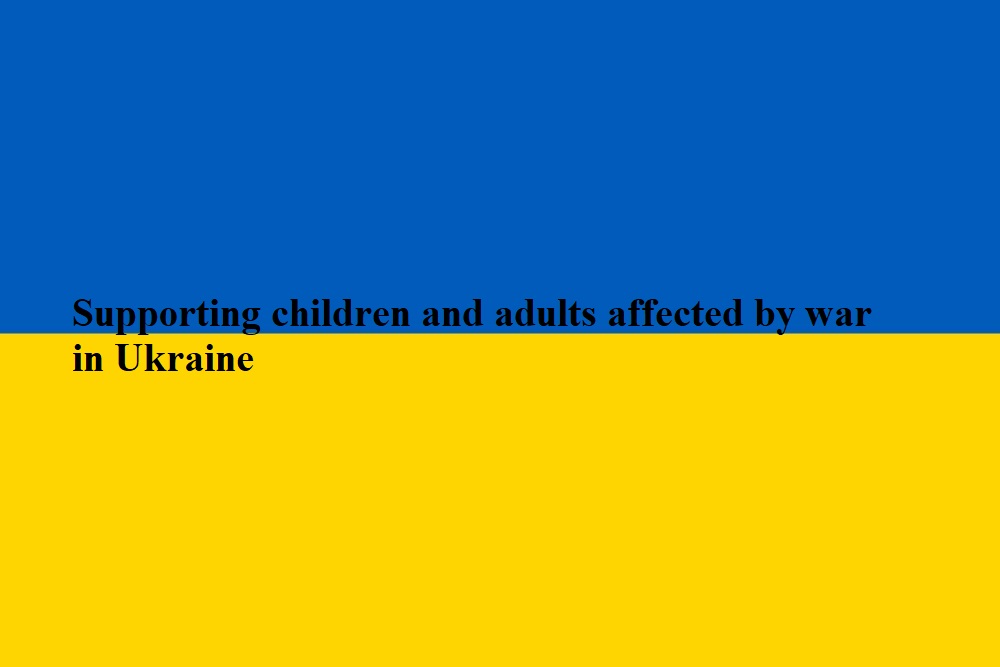Supporting children and adults affected by War in Ukraine
As Russia’s war against Ukraine rages on and thousands of people are forced from their homes, it’s easy to feel powerless, but there are ways we can all stand in solidarity with Ukraine and make a difference to those who have had to leave everything behind. We can also prepare for new arrivals in our schools, colleges, and communities.
For updated information please keep an eye on the website of our friends at the Irish Refugee Council.
https://www.irishrefugeecouncil.ie/ukraine-information-note
Irish Refugee Council is also keeping a register of people who are offering homes or rooms for Ukrainian refugees, which you will find on the same page.
Many schools, universities, and sanctuary groups are working with local-based initiatives to organize for funds and goods to be sent to refugees in Poland and elsewhere.
Teachers and parents can check our article on the Schools of Sanctuary website for ways we can speak to children about current events.
This is a time for us to find ways of practicing kindness, compassion, and understanding. Let us continue to show support to all refugees, remembering that in countries such as Afghanistan, Syria, Yemen, Sudan, and many other places, there are still heartbreaking and dangerous situations causing thousands to flee. It is heartening to see so many people across all stratas of our society stand up for the people of Ukraine, but your race or skin colour should never determine what support you receive. Politicians and pundits have described Ukrainian people as “civilised refugees”, commenting on how “like us” they are. This is racist and despicable. There is no such thing as an “uncivilized refugee”, just people looking for safety, compassion and understanding. We must all remind each other that being anti-war today, includes supporting refugees tomorrow. If you feel for the plight of Ukrianian families, you will also understand the plight of families forced to flee their homes in Syria, Afghanistan, Sudan and so many other countries.
As time goes on we will be posting updates and additional support for refugees, schools and communities.
Guidance and Resources for Parents, Carers and Teachers
Over the past week we have all seen headlines and news articles about the conflict in Ukraine, leaving many of us – including children – anxious about what’s happening, how it’s affecting so many people and what this could mean for the future. Drawing on a variety of articles and resources, in this post we share some advice for helping your child navigate the news they’ve been seeing and how they feel about it. In short, clarity, reassurance and compassion (both for how your child is feeling and for the Ukrainians affected by conflict) are key.
-
Let the Child Lead the Conversation
Children will respond differently to this news – some may be particularly anxious, some may be simply curious and others may not be aware. These reactions are also likely to vary by age and so the way in which we speak with children should be shaped by what’s appropriate for their age. For this reason, let the child lead the conversation and try not to start the conversation when emotional yourself or before they are ready – this might feed their own anxieties.
-
Listen and educate
Work from what your child already knows, making sure the information they have heard is correct and has come from a reliable source. This is particularly important given the proliferation of misinformation on apps like Tiktok and Instagram where many children and young people access news. If they are keen to learn more, then help direct them to reliable child-friendly sources of information. As you might expect though, it is not helpful to show them graphic images, share distressing stories and give overly complex explanations which might exacerbate their concerns.
-
Validate feelings
Be clear that the child’s response and feelings are valid and a natural reaction to the things they’ve heard. Be careful not to dismiss their concern and allow them to talk about it as much, or as little, as they wish.
-
Reassure
It is often helpful to explain that many situations like this have happened before and have been resolved. To help give context for older children, we can also explain that unfortunately other conflicts will happen in their lifetime and are already happening in other parts of the world. Ultimately, when talking with children, parents, carers, teachers and other responsible adults should make it clear that it is not the child’s responsibility to resolve this conflict and that there are many people working to help the people affected and bring an end to the war.
-
Give a practical outlet
Having said that, helping children get involved in a practical way with supporting people affected by the conflict can help them feel like they have some agency and thereby help reduce their anxiety. They could contribute to fundraisers or donation drives for people fleeing the conflict, send letters to local decision-makers asking them to do all they can to bring an end to the conflict and help people seeking safety find sanctuary in the UK, create drawings calling for peace or plant a sunflower garden (the sunflower is the national flower of Ukraine) showing solidarity with Ukrainians.
Other Resources
This advice has been shaped with help from the following articles and resources which we would encourage you to have a look through the better equip yourself for these conversations with the children in your care:
BBC Ros Atkins – A Three Minute Video Explainer (For Secondary-Age Students)
The Metro – How to talk to children about what’s happening in Ukraine and World War Three anxiety
The Choices Programme – The Ukraine Crisis (Lesson plan and resources aimed at older secondary age students).
Save the Children – How to Talk with Children about Ukraine
New York Times – How to Talk to Kids about Ukraine
The Guardian – ‘A delicate balance’: experts’ tips on dealing with Ukraine anxiety in children

